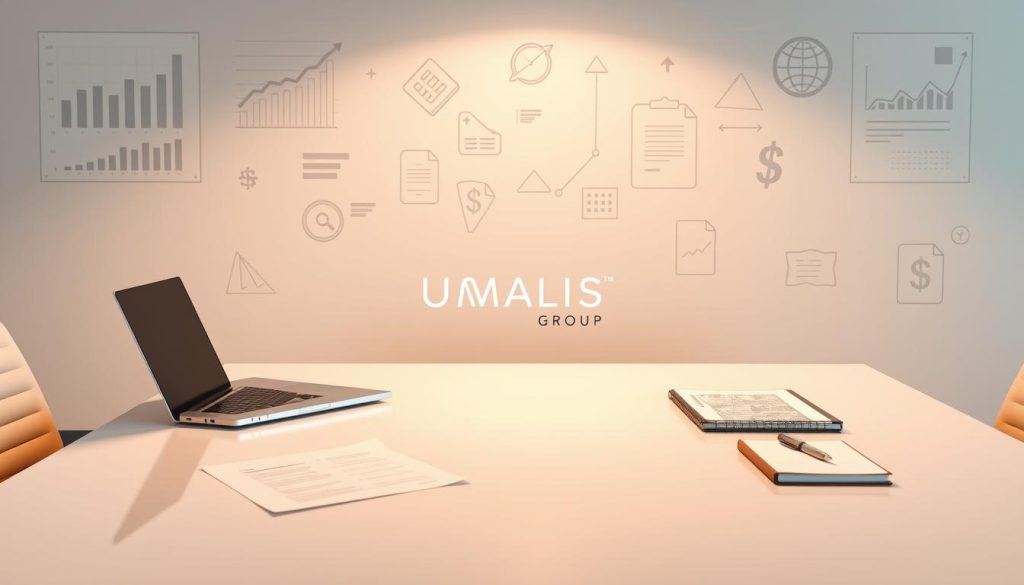Freelancing has become more common, making it crucial to know how to negotiate portage salarial contracts. It’s important to get a contract that fits your needs. We’ll look at key points to consider when negotiating, including tips and strategies for freelancers.
Recent stats show 64% of millennials prefer working on their own. The freelancing market is expected to grow by 30% by 2025. Knowing how to negotiate portage salarial contracts is key. Follow these tips to get a contract that works for you.
To negotiate portage salarial contracts well, you need to understand the basics. This includes knowing your worth, setting goals, and preparing documents. By being prepared, you can navigate negotiations better and get a contract that suits you.
Table of Contents
Key Takeaways
- Understand the importance of negotiating portage salarial contracts
- Research your market value to determine your worth
- Identify your goals and priorities when negotiating a contract
- Gather relevant documentation to support your negotiation
- Consider seeking conseils pour négocier son contrat de portage salarial from a professional
- Stay up-to-date on the latest freelance contract tips and strategies
Understanding Portage Salarial Contracts
Portage salarial contracts mix freelancing freedom with job security. To get the most out of them, knowing what portage salarial is and its benefits is key. Learning about portage salarial helps in freelance negotiation and strategies.
When negotiating freelance agreements, knowing common misconceptions about portage salarial contracts is important. Understanding the legal setup and IT sector in Luxembourg helps professionals make smart choices. Effective negotiation is crucial for a successful portage salarial contract. Getting freelance negotiation advice is very helpful.
- Access to employee benefits and administrative simplification
- Financial security and statutory employment rights
- Opportunities for professional growth and development
Understanding these points and using portage salarial negotiation strategies helps professionals work freelance with confidence and security.
Preparing for Contract Negotiation
To successfully negotiate a portage salarial contract, thorough preparation is key. You need to research your market value, set your goals, and gather important documents. Knowing your worth and the market helps you set a minimum salary. You can find great tips on freelance contract terms negotiation best practices.
Identify your goals, like the ideal work duration and mission types. This clarity helps you know what you aim for in the contract. Having your portfolio and references ready shows your value to clients. Being well-prepared lets you negotiate a contract that benefits you, using freelance contract negotiation best practices.
- Researching your market value to determine your minimum compensation
- Identifying your goals and what you want to achieve through the contract
- Gathering relevant documentation to demonstrate your value
By following these contractor salary negotiation tips and being ready, you can secure a portage salarial contract that suits your needs and helps you reach your goals.
Key Components of a Portage Salarial Contract
Understanding a portage salarial contract is key when you’re negotiating a freelance deal. It covers the role of the portage company, how fees are structured, and when you get paid. Knowing these details helps you negotiate better and make smart choices.
The portage company is important for handling things like taxes and social security. Fees can range from 5% to 10% of what you earn. It’s crucial to understand these terms to negotiate a good contract.
The Role of the Portage Company
The portage company is like a middleman between you and your client. They handle the paperwork and support you need. This lets you focus on your work while they handle the details.
Fee Structures and Charges
Fees for portage salarial contracts can differ. But, they usually take between 5% and 10% of your earnings. Knowing these fees is important when you’re negotiating a contract.
Some key points to think about when negotiating a portage salarial contract include:
- Understanding the role of the portage company
- Knowing the fee structures and charges
- Being aware of the payment schedules
By considering these points, you can negotiate a contract that works well for you. Remember to use freelance contract tips and conseils pour négocier son contrat de portage salarial to get the best deal.
| Contract Type | Duration | Fees |
|---|---|---|
| CDD en portage salarial | Up to 18 months, renewable twice | 5-10% of chiffre d’affaires généré |
| CDI en portage salarial | Indeterminate duration | 5-10% of chiffre d’affaires généré |
Setting Your Negotiation Strategy
To successfully negotiate a portage salarial contract, you need a solid strategy. This means establishing your baseline, your minimum rate, and knowing your counterpoints, or what you can negotiate on. Knowing what you want and what you can accept helps you clearly communicate with the portage company.
When looking at freelance negotiation advice, think about your goals and priorities. What are your must-haves, and what can you give up? Understanding these helps you craft a negotiation plan that suits your needs and benefits you the most.
Some key things to consider in your negotiation strategy include:
- Researching your market value to find your baseline rate
- Identifying your counterpoints and being ready to negotiate
- Choosing the right time to negotiate to get the best deal
By using these tips and applying portage salarial negotiation strategies, you can get a freelance agreement that works for you. This agreement will help you in the long run.

Negotiation is about finding common ground. Being ready, flexible, and willing to compromise helps you find an agreement that benefits both sides. This sets you up for success in your freelance career.
| Strategy | Benefits |
|---|---|
| Establishing your baseline | Ensures you receive fair compensation |
| Understanding your counterpoints | Allows for effective negotiation and compromise |
| Timing your negotiations | Maximizes your leverage and bargaining power |
Techniques for Effective Communication
Effective communication is key in freelance contract negotiation. It builds trust and rapport with clients. Clearly state your value, showing off your skills and expertise. Active listening skills are also crucial, helping you grasp the client’s needs and expectations.
Some important contractor salary negotiation tips include being well-prepared, knowing your worth, and being open to compromise. Understanding the freelance contract terms negotiation process and following freelance contract negotiation best practices is also vital. These strategies can lead to a successful negotiation and a positive outcome.
Non-verbal cues like body language and tone of voice also play a big role in negotiation. Being mindful of these can greatly influence the outcome. By combining effective communication with a deep understanding of negotiation, you can achieve success and foster a strong client relationship.
Statistics show the importance of effective communication in negotiation. For example, 85% of professionals say active listening boosts negotiation success. And 66% of freelancers think clear communication lowers negotiation conflicts. By focusing on effective communication and following freelance contract negotiation best practices, you can boost your chances of success and achieve a positive outcome.
| Statistic | Percentage |
|---|---|
| Professionals who believe active listening improves negotiation outcomes | 85% |
| Independent workers who believe clear communication reduces conflicts | 66% |
Building Rapport with the Portage Company
Creating a strong bond with the portage company is key for a good partnership. When negotiating a freelance contract, think about what the portage company wants. This way, you can make an agreement that works for both sides.
To build rapport, being quick to respond and proactive in talking is important. Being clear and dependable in your talks is crucial. Conseils pour négocier son contrat de portage salarial advise freelancers to share their hopes and needs clearly.
Some effective ways to build rapport include:
- Being on time and respectful in your talks
- Keeping your work updates regular
- Being open to feedback and ready to change
By using these methods, you can lay a solid base for your relationship with the portage company. This will help you do better in negotiations and get a contract that suits you. Always remember your freelance contract tips and ask for help when you need it.
Dealing with Compromise
When you’re dealing with portage salarial negotiation strategies, being open to compromise is key. Knowing when to give in and finding a balance between what you need and want is important. Being flexible can lead to situations where everyone wins.
Here are some tips to help you:
- Know what you can’t give up and be ready to compromise on other things
- Listen carefully to what the other side wants and needs
- Try to find solutions that benefit both sides
By using these freelance negotiation advice tips, you can get through negotiations and find a contract that fits your needs. Keep your goals in mind and be ready to adjust as needed. With the right strategy, you can get a portage salarial deal that works for you.
For more tips on how to negotiate freelance agreement, talk to a pro or look for advice from trusted sources. Being prepared and flexible can lead to a successful negotiation and a good contract.
| Tip | Description |
|---|---|
| Stay flexible | Be open to compromise and willing to adapt to changing circumstances |
| Listen actively | Pay attention to the other party’s needs and priorities |
| Look for mutually beneficial solutions | Seek solutions that satisfy both parties and create a win-win scenario |
Understanding Legal Aspects
When you’re in the world of portage salarial contracts, knowing the legal side is key. Contractor salary negotiation tips stress the need to grasp the legal rules. In France, laws like Law No. 2008-789 and Law No. 2010-751 have shaped social democracy and union roles.
Understanding the legal rules for freelance contract terms negotiation is crucial. It’s about knowing the rights and duties of both freelancer and client. Freelance contract negotiation best practices often include getting legal advice to make sure the contract is fair and follows the law.
Important regulations include those on union rights, employee involvement, and labor laws. For example, France’s 2012 social conference brought together all employee and employer groups. This move aimed to ensure full representation and more people involved. Knowing these rules helps freelancers and clients negotiate confidently.
Being informed about the legal side of portage salarial contracts helps both freelancers and clients. It ensures agreements are fair, follow the law, and benefit everyone. This knowledge can prevent problems and make negotiations smoother and more effective.
Crafting the Final Contract
Making the final contract is key in negotiations. You need to pay close attention to every detail. This ensures all terms and conditions are clear. When negotiating freelance contract, it’s vital to review the contract carefully. Ask for explanations on any parts you don’t understand.
This step involves knowing how to conseils pour négocier son contrat de portage salarial. This way, you get a contract that fits your needs and benefits you the most.
Some important things to think about when making the final contract include:
- Clearly defining the scope of work and payment terms
- Establishing a process for resolving disputes or disagreements
- Outlining the expectations for communication and collaboration
Being detailed and following freelance contract tips helps make sure your contract is complete. It also protects your interests. Don’t forget to use conseils pour négocier son contrat de portage salarial to help you through the negotiation.
The main goal of making the final contract is to create a win-win agreement. This agreement should be the start of a successful and productive working relationship. By focusing on clarity, communication, and teamwork, you can lay a solid foundation for your freelance work. This will help you reach your goals.
Post-Negotiation Steps
After you’ve negotiated your freelance agreement, it’s important to follow up with the portage company. You should also keep an eye on how the contract is performing. This makes sure everyone sticks to the agreed terms and sets the stage for future talks. Getting freelance negotiation advice can help you understand how to manage the contract and track its performance.
Using smart portage salarial negotiation strategies can make a big difference. For example, being clear about what work needs to be done, how payments will be made, and how you’ll communicate can prevent misunderstandings. Knowing how to negotiate terms that work well for both sides is crucial for a good partnership.
Following Up with the Portage Company
Keeping in touch is key. You can do this by having regular meetings or sending updates. This makes sure everyone knows what’s happening with the project and any problems that come up.
Monitoring Contract Performance
This means watching how services are delivered, when payments are made, and if all other contract rules are followed. It’s a way to catch and fix any problems early on.
Preparing for Future Negotiations
By learning from your current negotiation and contract performance, you can get ready for future talks. You can look for ways to improve, update your portfolio, and maybe even offer more services. With freelance negotiation advice and a good grasp of portage salarial negotiation strategies, you’ll be in a better position for more beneficial agreements in the future.
| Aspect of Negotiation | Importance | Strategy |
|---|---|---|
| Clear Communication | High | Regular Updates and Feedback |
| Scope of Work | Critical | Well-defined Project Objectives |
| Payment Terms | High | Clear Payment Schedules and Methods |
Continuous Improvement in Negotiation Skills
To be a top freelancer, you must keep improving your negotiation skills. This means learning from past deals, getting feedback, and picking up new skills. By doing this, you’ll get better at negotiating and land contracts that are good for you. For example, negotiating freelance contract terms needs you to know the market and your value well.
Some important contractor salary negotiation tips are to research the market, know your worth, and be confident. Also, freelance contract negotiation best practices include being clear and concise, listening well, and being open to compromise. Following these tips will help you get fair and profitable contracts.
- More confidence in negotiations
- Better communication skills
- Ability to get better contracts
- Stronger reputation as a freelancer
By focusing on improving your negotiation skills, you’ll stay competitive in the freelance world. Always keep learning, ask for feedback, and develop new skills to stay on top.
Common Mistakes to Avoid
When you’re negotiating a freelance contract, knowing common mistakes is key. These mistakes can slow down the negotiation. It’s important to negotiate terms that are fair and reasonable.
Ignoring Market Research
Ignoring market research is a big mistake. It can make you charge too little or too much. To avoid this, do your homework on the market. This will help you make smart choices during the negotiation.
Seeking conseils pour négocier son contrat de portage salarial can also be helpful. It can guide you through the process.
Underestimating Emotional Dynamics
Not understanding the emotional side of negotiation is another mistake. It’s important to be empathetic and build trust. This can lead to a better outcome.
Remember, freelance contract tips can prepare you for the negotiation. They help you stay ready for any situation.
Failing to Prepare for Counteroffers
Not being ready for counteroffers is a big mistake. It can surprise you. To avoid this, think about possible counteroffers and how you’ll respond.
This will keep you calm and confident. It ensures you get a contract that works for you.
- Research the market to determine your worth
- Prepare for emotional dynamics and approach the conversation with empathy
- Anticipate potential counteroffers and have a plan in place for responding to them

Conclusion and Final Thoughts
As we wrap up this guide onnegotiating portage salarial contracts, let’s review the main strategies. Preparation, clear communication, and a drive for improvement are key. They help you get a contract that fits your career goals and needs.
Recap of Key Strategies
We’ve talked about knowing your worth, setting clear goals, and having the right documents. It’s also vital to share your value, listen well, and handle emotions in negotiations.
Final Advice for Successful Negotiation
In negotiation’s final stages, being flexible and willing to compromise is crucial. Knowing when to give in and finding a middle ground can lead to good agreements. The aim is to win for both sides, helping your freelance career and the portage company.
Next Steps
As you negotiate portage salarial contracts, carefully review the agreement. If needed, get legal advice and understand your rights and duties. Also, prepare for future talks by learning from your experiences, getting feedback, and improving your negotiation skills. This way, you’ll be ready for the challenges of international freelance work and secure good contracts for your career.
FAQ
What is portage salarial and how does it work?
Portage salarial is a way for freelancers to work with a company. This company handles the paperwork and legal stuff. It lets the freelancer focus on their work.
What are the key benefits of using a portage salarial company?
Using a portage salarial company offers financial security and legal rights. It also gives administrative support. Freelancers get stability and legal protection.
What are some common misconceptions about portage salarial contracts?
Some think portage salarial is only for certain jobs or is more expensive. They also believe freelancers lose their freedom. But, it offers flexibility and security for many professionals.
How can I research my market value when negotiating a portage salarial contract?
To find your market value, look at job postings and industry benchmarks. Talk to peers in your field. This helps you understand what you should be paid.
What are the key elements to consider when identifying my goals for a portage salarial contract?
Think about the contract length, projects you want, and your pay. Also, consider any benefits or protections you need.
What documentation should I gather before negotiating a portage salarial contract?
Collect your resume, portfolio, and client references. Include any past contracts or pay info. This shows your value and supports your negotiation.
What is the role of the portage company in a portage salarial contract?
The portage company is your employer. They handle invoicing, payroll, and legal stuff. They provide the framework for you to work in, for a fee.
How are fees and charges structured in a portage salarial contract?
Fees are usually a percentage of your earnings or a fixed monthly fee. This covers the company’s services.
What are the different payment schedules in a portage salarial contract?
Payments can be monthly, milestone-based, or a mix. Know the payment terms to manage your cash flow.
How can I establish my baseline and minimum acceptable rate for a portage salarial contract?
Consider your market value, desired pay, and the costs of the arrangement. Set a minimum rate that meets your financial and professional goals.
What are some common negotiation tactics I should be aware of?
Watch out for low initial offers and deadlines. Be ready to counter these tactics and negotiate well.
How can I effectively communicate my value proposition during the negotiation process?
Clearly talk about your skills, experience, and value. Use examples and numbers to show your worth. Listen well and understand the other side’s needs.
What strategies can I use to build rapport with the portage company?
Be quick to respond and proactive in communication. Be transparent and reliable. Show you care about their needs and priorities.
How can I balance my needs and wants when compromising during the negotiation process?
Know your non-negotiables and flexible wants. Look for solutions that meet your needs and the other side’s.
What are some key legal considerations to keep in mind when negotiating a portage salarial contract?
Understand the laws and regulations. Get legal advice if needed. Make sure the contract protects your rights, like the trial period and termination conditions.
How can I effectively review and finalize the portage salarial contract?
Carefully review the contract terms. Ask for clarity on unclear points. Ensure the agreement reflects the agreed terms. This avoids misunderstandings later.
What should I do after the negotiation process is complete?
Follow up with the portage company to keep a good relationship. Monitor the contract’s performance. Prepare for future negotiations by reviewing the contract and looking for improvements.
How can I continuously improve my negotiation skills?
Learn from past experiences and seek feedback. Use training programs or online courses. This makes you a better negotiator over time.
What are some common mistakes to avoid when negotiating a portage salarial contract?
Don’t ignore market research or underestimate the negotiation’s emotional side. Be prepared for counteroffers. Knowing these mistakes helps you negotiate better.
Source Links
- Ageing and Employment Policies: France 2014 – https://www.oecd.org/content/dam/oecd/en/publications/reports/2014/01/ageing-and-employment-policies-france-2014_g1g39520/9789264207523-en.pdf
- WAGE PORTAGE – PVB Freelance – https://pvb-freelance.fr/wage-portage/
- Blog – Portage-si – https://portage-si.fr/blog/
- Portage salarial – https://entreprendre.service-public.fr/vosdroits/F31620
- Le portage salarial | Travail-emploi.gouv.fr | Ministère du Travail, de la Santé, des Solidarités et des Familles – https://travail-emploi.gouv.fr/le-portage-salarial
- PDF – https://doctorat.univ-lille.fr/fileadmin/user_upload/sites_services/Doctorat/PDF/Les_Formations_Doctorales_Professionnelles_2021_2022.pdf
- Order Paper and Notice Paper No. 045 – 43-1 / Feuilleton et Feuilleton des avis No. 045 – 43-1 – https://www.ourcommons.ca/Content/House/431/NoticeOrder/045A/ordpaper045A.PDF
- CDI en Portage Salarial : Tout Ce Qu’il Faut Savoir – https://www.2iportage.com/les-specificites-du-cdi-en-portage-salarial-tout-ce-quil-faut-savoir/
- Portage Salarial : devenez freelance – https://weepo.fr/portage-salarial
- cover_1.doc – http://en.copian.ca/litweb/other/cclow/newslet/1989/sep_v7/cover_1.pdf
- PDF – https://www.institutmontaigne.org/ressources/pdfs/publications/travailleurs-des-plateformes-liberte-oui-protection-aussi-rapport.pdf
- Le portage salarial : une pratique plébiscitée – https://www.petit-bulletin.fr/lyon/article-79234-le-portage-salarial-une-pratique-plebiscitee.html
- Texte de base : Convention collective de branche des salariés en portage salarial du 22 mars 2017 – https://www.legifrance.gouv.fr/conv_coll/id/KALITEXT000035184768
- Plan du site – Links Consultants – https://www.links-consultants.com/plan_du_site
- Quand et comment augmenter ses tarifs en freelance ? – https://www.join-jump.com/guide/comment-augmenter-ses-tarifs-freelance
- Guide du freelance : Devenir Freelance – https://fr.slideshare.net/slideshow/guide-du-freelance-devenir-freelance/253458261
- PDF – https://www.fnasfo.fr/wp-content/uploads/2018/01/bulletin-310-rapport-activite.pdf
- Journal des débats de la Commission parlementaire permanente de la présidence du conseil – Assemblée nationale du Québec – https://www.assnat.qc.ca/fr/travaux-parlementaires/commissions/cpppc-avant-1984-28-4/journal-debats/CPPPC-690507.html?appelant=MC
- Urgence économique outre-mer à la suite de la crise du Covid-19 – Sénat – https://www.senat.fr/rap/r19-620/r19-62016.html
- Représentativités syndicales, représentativités patronales. Règles … – https://journals.openedition.org/travailemploi/5729?lang=en
- 0000.pdf – https://www.vie-publique.fr/files/rapport/pdf/104000431.pdf
- Freelance : Guide complet du freelancing (en 2025) – Alex so yes – https://alexsoyes.com/devenir-freelance/
- Microsoft Word – Etude GUE FR_10032021.docx – https://left.eu/app/uploads/2021/02/Etude-GUE-FR_MV.pdf
- Plain text – https://thedocs.worldbank.org/en/doc/449961588854306313-0240021991/render/WorldBankGroupArchivesFolder1083083.txt
- PDF – https://www.enseignementsup-recherche.gouv.fr/sites/default/files/imported_files/documents/BO_26_MESRI_1148226.pdf
- Une politique salariale individuelle – https://fr.slideshare.net/slideshow/une-politique-salariale-individuelle/55571805
- Rapports de qualification en milieux ouvriers : du primat des qualifications attribuées au contrôle des rapports salariaux dans les usines gabonaises du bois – https://www.academia.edu/100395516/Rapports_de_qualification_en_milieux_ouvriers_du_primat_des_qualifications_attribuées_au_contrôle_des_rapports_salariaux_dans_les_usines_gabonaises_du_bois
- docmeeting : navigation – https://www.docmeeting.com/rcnnavigwin.php?pid=187&RCD_ID=94&rcex=1&labelos=
- Portage salarial international : le guide complet | Rippling – https://www.rippling.com/fr-FR/blog/portage-salarial-international





